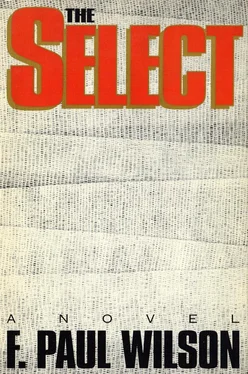F. Wilson - The Select
Здесь есть возможность читать онлайн «F. Wilson - The Select» весь текст электронной книги совершенно бесплатно (целиком полную версию без сокращений). В некоторых случаях можно слушать аудио, скачать через торрент в формате fb2 и присутствует краткое содержание. Жанр: Старинная литература, на английском языке. Описание произведения, (предисловие) а так же отзывы посетителей доступны на портале библиотеки ЛибКат.
- Название:The Select
- Автор:
- Жанр:
- Год:неизвестен
- ISBN:нет данных
- Рейтинг книги:4 / 5. Голосов: 1
-
Избранное:Добавить в избранное
- Отзывы:
-
Ваша оценка:
- 80
- 1
- 2
- 3
- 4
- 5
The Select: краткое содержание, описание и аннотация
Предлагаем к чтению аннотацию, описание, краткое содержание или предисловие (зависит от того, что написал сам автор книги «The Select»). Если вы не нашли необходимую информацию о книге — напишите в комментариях, мы постараемся отыскать её.
_________________
The Select — читать онлайн бесплатно полную книгу (весь текст) целиком
Ниже представлен текст книги, разбитый по страницам. Система сохранения места последней прочитанной страницы, позволяет с удобством читать онлайн бесплатно книгу «The Select», без необходимости каждый раз заново искать на чём Вы остановились. Поставьте закладку, и сможете в любой момент перейти на страницу, на которой закончили чтение.
Интервал:
Закладка:
"Do it on a need basis," Tim said. "The guy whose heart has the worst coronary arteries and is just about to quit gets first spot on the list, and the next worst gets second, and so on."
Quinn said, "But what about the guy who's far down the list with only one bad coronary artery, but his angina's bad enough to keep him from running his fork lift? Does he have to wait till he's in cardiogenic shock before he gets some help?"
"If he gets worse, we move him up the list."
"In other words, under your system people will have to get sicker before they can get well?"
Tim scratched his head, his expression troubled. "You know, I never looked at it like that."
"Okay, Quinn," Judy said. "Now that you've shot everything down, what's your solution to the mess?"
"The coming mess," Quinn said. "Dr. Alston talks like it's already here, but it's not. And with the way medical knowledge and technology are advancing, the entire practice of medicine could be revolutionized by 2011. It might be nothing like what we see today. We'll have new resources, new methods of delivery, we might be able to handle —"
"You can't count on that," Judy said.
"Technological growth is exponential," Quinn said. "As the base broadens—"
"You still can't count on it."
Quinn sighed. Judy was right. No matter what happened, the Medicare population was going to double in the next thirty to forty years, but medical resources weren't going to double with them.
She had a sudden vision of the future. She found herself in the worn-down and rusted-out body of an elderly woman, seventy-six years old, with a failing heart, gallstones, and arthritis, trudging from specialist to specialist, clinic to clinic, hospital to hospital, trying to find relief, and being told repeatedly that none of her conditions met the established criteria that would allow immediate medical intervention, so she'd have to wait her turn.
True enough, perhaps, on paper. True enough according to the numbers the medical facilities had used to encode her diagnoses for the government computers.
True enough: Her heart failure had been gauged as Grade II, which meant the old pump was failing, its reserve low enough to make a breathless chore of walking a single block, but still pumping well enough to keep her from being completely incapacitated; Grade II heart failure warranted only a limited work-up and certainly not aggressive therapy.
True enough: Her Grade II gallbladder disease did not trigger attacks of sufficient severity to yellow her skin or generate enough unremitting pain to warrant emergency surgery, but her rattling gallstones did cause her daily abdominal distress and incessant belching, and she lived in constant fear of another attack, so much so that each meal had become a form of gastric Russian roulette.
True enough: The Grade III arthritis in her hip elicited a bolt of pain whenever she went up or down a stair, and her spine was arthritic enough to cause it to stiffen like a rusty gate whenever she sat or reclined for more than fifteen minutes, which made rising from a chair or getting out of bed each morning an excruciating ordeal; but her symptoms—when adjusted for age—did not code severe enough (you needed Grade V) under the federal guidelines to warrant hip surgery or even one of the newer, more potent anti-inflammatory medications that were in such short supply; she'd have to make do with the older, more tried-and-true (and lower-priced) generics.
All true enough—when each condition was considered one at a time. If she had been afflicted with just the arthritis, or merely the gallstones, or simply the heart failure, she could have handled it. And she even might have coped fairly well with a combination of any two of them.
But all three?
The triple whammy was slowly doing her in, melting her days into exhausted blurs, nibbling away at her quality of life to the point where she'd begun to wonder whether life was worth living any longer.
Why wasn't there a code for the quality of life? Why couldn't the computers add up a person's Grade II's and Grade III's and send up a red flag that said Help when they reached a certain critical number—regardless of age?
Was that what it was going to be like? Number-coded doctors treating the number-coded diseases afflicting number-coded patients? There had to be another way.
But what?
"Quinn?" It was Tim's voice. "Yo, Quinn. Where are you? Come back to us."
Quinn shook herself. "I'm, uh, thinking," she said.
"Good," Tim said. "I thought you were in a trance. Come up with anything?"
"No," she said. "No solution. Sooner or later the politicians and bureaucrats are going to take over completely. They can control the funds and the distribution of their so-called resources—and they'll consider us 'resources' too—but they can't control the delivery of compassion, can they?"
Judy groaned but Tim cut her off with a karate-chop wave of his hand.
Tim nodded. "You said it. The empty suits will try to get into the hospital charts, into the operating rooms, into the office records, even into the examining rooms." He tapped his chest. "They'll even try to get in here, and believe me, plenty of times they'll succeed, but they can't get a piece of that special chemistry that happens between a doctor and a patient unless we let them. And part of that chemistry is compassion. Empathy."
"The floor's getting gooey with idealism," Judy said. "How about a little realism here?"
"We're still students," Tim said. "We're not supposed to be realists. That comes later. For the moment let's believe in the healing power of compassion."
Quinn saw the fire in his eyes, the ferocity in his tight smile, and knew she'd found a kindred spirit. She raised a fist to chin level and responded with a smile of her own.
"Compassion," she said. "Let 'em find a procedure code for that ."
MONITORING
"I believe it's time to start the night music," Alston said. "What do you think?"
Louis Verran concealed his annoyance as Alston stood with his hands behind his back and leaned forward over his shoulder, studying the main console.
Right, Verran thought. Like he almost knows what he's looking at.
"You're the boss," he said, not meaning a word of it. In this room Louis Verran was the boss.
Alston pointed to one of the read-outs. "My goodness, what's going on in room 107."
Verran glanced up. The mattress weight sensor for bed B had risen into the red.
"Looks like some extra bodies on the bed. I'd guesstimate about four."
Alston's eye widened. "Really? What on earth could they be doing?"
"Probably an orgy," Verran said, keeping his face deadpan. "Don't you wish we had video?"
"Certainly not. Turn up the audio and let's hear what's going on."
Verran activated the audio. All of the rooms had been wired with tiny electret microphones. The sound of male voices quizzing each other on hepatic histology swelled through the speakers.
"Orgy indeed!" Alston said. He pointed to another read-out panel. "Look at room 224. What's—?"
Verran took a deep puff on his cigar and floated a trio of blue-white smoke rings. He watched with concealed amusement as Alston backed away, waving his hand through the air.
"Must you, Louis?"
"If you can't stand the smoke," Verran muttered, "stay away from the console."
He glanced at Alston and was startled by the fury that flashed across his features. It showed only for an instant, then was gone as if it had never been, and the prissy, supercilious expression was back in control. But Verran realized his remark had caused the mask to slip and allowed a darker side of Dr. Arthur Alston to peek through.
Verran glanced at Kurt and Elliot. Both of his assistants were busy at their own consoles, checking the mattress sensors to see who was in bed and who wasn't. They gave no indication that they had heard or seen anything. Good. They'd learned quickly to act oblivious to the squabbles between their boss and Dr. Alston. Verran had known them both when he'd been with the CIA. He'd hired them away from the Company when he'd landed this job.
Читать дальшеИнтервал:
Закладка:
Похожие книги на «The Select»
Представляем Вашему вниманию похожие книги на «The Select» списком для выбора. Мы отобрали схожую по названию и смыслу литературу в надежде предоставить читателям больше вариантов отыскать новые, интересные, ещё непрочитанные произведения.
Обсуждение, отзывы о книге «The Select» и просто собственные мнения читателей. Оставьте ваши комментарии, напишите, что Вы думаете о произведении, его смысле или главных героях. Укажите что конкретно понравилось, а что нет, и почему Вы так считаете.












